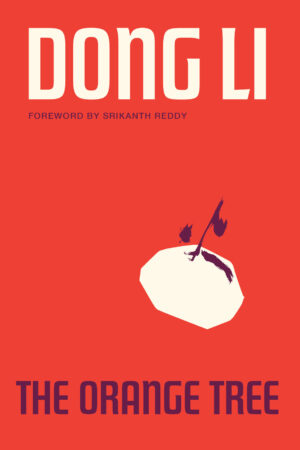The Orange Tree
by Dong Li
reviewed by Manan Kapoor
Dong Li’s debut collection The Orange Tree opens with—next to what seem like Chinese characters—a list of neologisms:
The longdead
The griefwall
The springautumn
Li is a multilingual poet and translator of Chinese, French, English, and German literature, so we assume, as Srikanth Reddy notes in the foreword, these compound words are translations. However, in “Aviary of Water and Fire” (the collection’s first section), Li complicates our assumptions as we reencounter these words:
When spring and autumn clashed in the Middle Kingdom.
The first emperor, Qin Shi Huang, rose to unification before Christ.
“Longdead” makes an appearance on the next page:
Maternal Great-Grandparents have been dead for a long time.
Paternal Great-Grandparents too.
Maternal Grandparents are long dead.
These invented compound words, which appear in the beginning of each section, haunt our imagination throughout the collection. The focus, however, soon shifts. The blasé description of historical events and figures starts to seem strange as the narrator moves from the death of his maternal great-grandparents to the dying “Ma” and “Fa” and, finally, closer to the self:
Am I dead or dying.
Is death the only family.
The narrator’s “I” makes a rare appearance in this poem. Throughout the collection, the absence of punctuation (and, in the lines quoted above, the absence of a question mark), as well as the presence of enjambment, neologisms, and unusual syntax, forces readers to pause and question their relationship to language. In “The Orange Tree”—the second section, where we encounter a new set of neologisms including “The yellowedphoto,” “The hangingwindow,” and “The burningwhite”—Li begins with this description: “In a yellowed family photo, there is an orange tree, leaves burned.” The titular orange tree, its falling fruit, its leaves which turn red and burn white, and the “orange parties” hosted under its shade are central to the poem—not as a peripheral metaphor, but as a barometer of loss and happiness, a marker of rebirth and renewal, both familial and political. In the poem, the history of China turns into a lens through which Li’s narrator bears witness to family history and vice versa. We become familiar with the family’s past only to realize how deeply interwoven it is with the fabric of modern Chinese history:
The Cultural Revolution began, following Three Years of Natural Disasters.
Mother was four.
She survived famine on orange peels.
Thirty-eight million people died from hunger.
Who is this child-like narrator? Li’s way of recounting these incidents, in lines like, “Soon he hanged himself by the window” (the “hangingwindow”) is at first unsettling. Soon, however, the alluring simplicity of the child-like voice in “The Orange Tree” wins us over. Li invites us to reflect on these historical and personal tragedies and make sense of the narrator’s secondhand memories.
The way familial, cultural, and national history unfolds in The Orange Tree leads to a deeper appreciation of language and loss. Li’s English combines the translator’s alertness to the complexities of language with the transnational poet’s varied lexicon. In an interview, Li speaks about his relationship with the English language:
[In America] I missed my family and their faces… I absorbed words and voices that embodied them, as I stumbled to better my English and engage more in class. Simple words were my best companions. I said hello to them every day and held onto them when my hands sweated.
The final section of The Orange Tree, titled “Glossary: in search of words,” offers a list of all the invented compound words in the collection. Li offers no explanations. By this time, however, no explanation is required. “Words are mulled over solitarily, but nobody owns them. We share them,” Li says in the same interview, “when I write, I am collaborating with this vast presence of words and voices that give them life and nuance.” As we finish reading Li’s collection, slowly absorbing these invented words, his voice has given life, nuance, and reason to them. At the end, we, too, share these words.
Published on May 4, 2023

